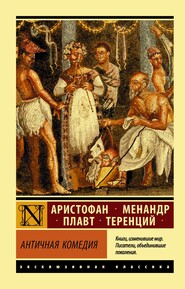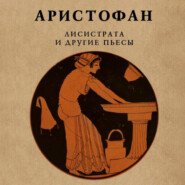По всем вопросам обращайтесь на: info@litportal.ru
(©) 2003-2024.
✖
The Eleven Comedies, Volume 1
Автор
Год написания книги
2018
Настройки чтения
Размер шрифта
Высота строк
Поля
CALONICÉ. Yes! upon my word, 'tis a levy en masse of all the female population of Anagyra!
MYRRHINÉ. Are we late, Lysistrata? Tell us, pray; what, not a word?
LYSISTRATA. I cannot say much for you, Myrrhiné! you have not bestirred yourself overmuch for an affair of such urgency.
MYRRHINÉ I could not find my girdle in the dark. However, if the matter is so pressing, here we are; so speak.
LYSISTRATA. No, but let us wait a moment more, till the women of Boeotia arrive and those from the Peloponnese.
MYRRHINÉ Yes, that is best…. Ah! here comes Lampito.
LYSISTRATA. Good day, Lampito, dear friend from Lacedaemon. How well and handsome you look! what a rosy complexion! and how strong you seem; why, you could strangle a bull surely!
LAMPITO. Yes, indeed, I really think I could. 'Tis because I do gymnastics and practise the kick dance.[399 - In allusion to the gymnastic training which was de rigueur at Sparta for the women no less than the men, and in particular to the dance of the Lacedaemonian girls, in which the performer was expected to kick the fundament with the heels—always a standing joke among the Athenians against their rivals and enemies the Spartans.]
LYSISTRATA. And what superb bosoms!
LAMPITO. La! you are feeling me as if I were a beast for sacrifice.
LYSISTRATA. And this young woman, what countrywoman is she?
LAMPITO. She is a noble lady from Boeotia.
LYSISTRATA. Ah! my pretty Boeotian friend, you are as blooming as a garden.
CALONICÉ. Yes, on my word! and the garden is so prettily weeded too![400 - The allusion, of course, is to the 'garden of love,' the female parts, which it was the custom with the Greek women, as it is with the ladies of the harem in Turkey to this day, to depilate scrupulously, with the idea of making themselves more attractive to men.]
LYSISTRATA. And who is this?
LAMPITO. 'Tis an honest woman, by my faith! she comes from Corinth.
LYSISTRATA. Oh! honest, no doubt then—as honesty goes at Corinth.[401 - Corinth was notorious in the Ancient world for its prostitutes and general dissoluteness.]
LAMPITO. But who has called together this council of women, pray?
LYSISTRATA. I have.
LAMPITO. Well then, tell us what you want of us.
LYSISTRATA. With pleasure, my dear.
MYRRHINÉ. What is the most important business you wish to inform us about?
LYSISTRATA. I will tell you. But first answer me one question.
MYRRHINÉ. What is that?
LYSISTRATA. Don't you feel sad and sorry because the fathers of your children are far away from you with the army? For I'll undertake, there is not one of you whose husband is not abroad at this moment.
CALONICÉ. Mine has been the last five months in Thrace—looking after Eucrates.[402 - An Athenian general strongly suspected of treachery; Aristophanes pretends his own soldiers have to see that he does not desert to the enemy.]
LYSISTRATA. 'Tis seven long months since mine left me for Pylos.[403 - A town and fortress on the west coast of Messenia, south-east part of Peloponnese, at the northern extremity of the bay of Sphacteria—the scene by the by of the modern naval battle of Navarino—in Lacedaemonian territory; it had been seized by the Athenian fleet, and was still in their possession at the date, 412 B.C., of the representation of the 'Lysistrata,' though two years later, in the twenty-second year of the War, it was recovered by Sparta.]
LAMPITO. As for mine, if he ever does return from service, he's no sooner back than he takes down his shield again and flies back to the wars.
LYSISTRATA. And not so much as the shadow of a lover! Since the day the Milesians betrayed us, I have never once seen an eight-inch-long godemiche even, to be a leathern consolation to us poor widows…. Now tell me, if I have discovered a means of ending the war, will you all second me?
MYRRHINÉ. Yes verily, by all the goddesses, I swear I will, though I have to put my gown in pawn, and drink the money the same day.[404 - The Athenian women, rightly or wrongly, had the reputation of being over fond of wine. Aristophanes, here and elsewhere, makes many jests on this weakness of theirs.]
CALONICÉ. And so will I, though I must be split in two like a flat-fish, and have half myself removed.
LAMPITO. And I too; why, to secure Peace, I would climb to the top of Mount Taygetus.[405 - The lofty range of hills overlooking Sparta from the west.]
LYSISTRATA. Then I will out with it at last, my mighty secret! Oh! sister women, if we would compel our husbands to make peace, we must refrain….
MYRRHINÉ. Refrain from what? tell us, tell us!
LYSISTRATA. But will you do it?
MYRRHINÉ. We will, we will, though we should die of it.
LYSISTRATA. We must refrain from the male organ altogether…. Nay, why do you turn your backs on me? Where are you going? So, you bite your lips, and shake your heads, eh? Why these pale, sad looks? why these tears? Come, will you do it—yes or no? Do you hesitate?
MYRRHINÉ. No, I will not do it; let the War go on.
LYSISTRATA. And you, my pretty flat-fish, who declared just now they might split you in two?
CALONICÉ. Anything, anything but that! Bid me go through the fire, if you will; but to rob us of the sweetest thing in all the world, my dear, dear Lysistrata!
LYSISTRATA. And you?
MYRRHINÉ. Yes, I agree with the others; I too would sooner go through the fire.
LYSISTRATA. Oh, wanton, vicious sex! the poets have done well to make tragedies upon us; we are good for nothing then but love and lewdness![406 - In the original "we are nothing but Poseidon and a boat"; the allusion is to a play of Sophocles, now lost, but familiar to Aristophanes' audience, entitled 'Tyro,' in which the heroine, Tyro, appears with Poseidon, the sea-god, at the beginning of the tragedy, and at the close with the two boys she had had by him, whom she exposes in an open boat.] But you, my dear, you from hardy Sparta, if you join me, all may yet be well; help me, second me, I conjure you.
LAMPITO. 'Tis a hard thing, by the two goddesses[407 - "By the two goddesses,"—a woman's oath, which recurs constantly in this play; the two goddesses are always Demeter and Proserpine.] it is! for a woman to sleep alone without ever a standing weapon in her bed. But there, Peace must come first.
LYSISTRATA. Oh, my dear, my dearest, best friend, you are the only one deserving the name of woman!
CALONICÉ. But if—which the gods forbid—we do refrain altogether from what you say, should we get peace any sooner?
LYSISTRATA. Of course we should, by the goddesses twain! We need only sit indoors with painted cheeks, and meet our mates lightly clad in transparent gowns of Amorgos[408 - One of the Cyclades, between Naxos and Cos, celebrated, like the latter, for its manufacture of fine, almost transparent silks, worn in Greece, and later at Rome, by women of loose character.] silk, and with our "mottes" nicely plucked smooth; then their tools will stand like mad and they will be wild to lie with us. That will be the time to refuse, and they will hasten to make peace, I am convinced of that!
LAMPITO. Yes, just as Menelaus, when he saw Helen's naked bosom, threw away his sword, they say.
CALONICÉ. But, poor devils, suppose our husbands go away and leave us.
LYSISTRATA. Then, as Pherecrates says, we must "flay a skinned dog,"[409 - The proverb, quoted by Pherecrates, is properly spoken of those who go out of their way to do a thing already done—"to kill a dead horse," but here apparently is twisted by Aristophanes into an allusion to the leathern 'godemiche' mentioned a little above; if the worst comes to the worst, we must use artificial means. Pherecrates was a comic playwright, a contemporary of Aristophanes.] that's all.











